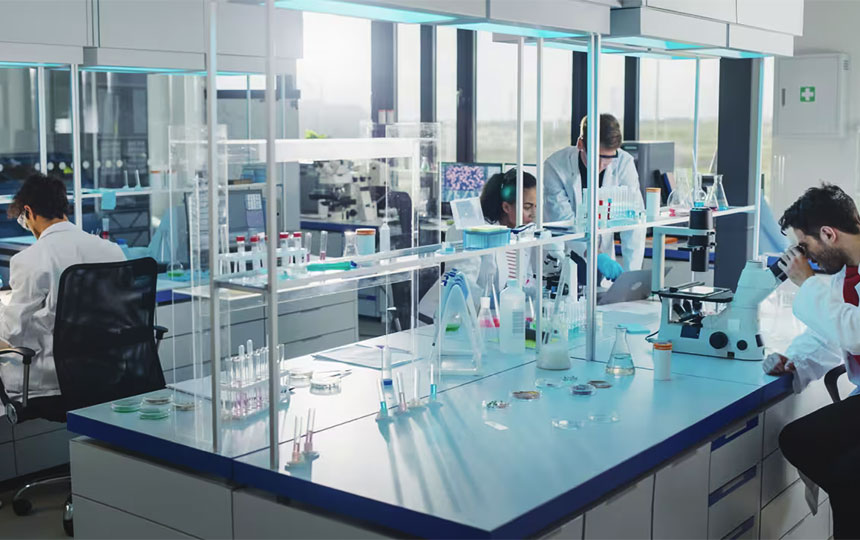In This Article We Will Explore The Topic “Is Shared Lab Space the Right Choice in New Jersey?”
New Jersey has a well-developed base in the biotechnology and pharmaceutical industries and provides various structural possibilities for business development.
Amongst these, the concept of open-access shared laboratories is seen as a feasible solution, especially for young innovative companies and small to medium size firms. Shared laboratories offers an opportunity to reduce the costs of equipment and infrastructure while at the same time exploring chances for collaboration and access to expensive equipment.
While the shared lab space model has several benefits for businesses within New Jersey, this article will also discuss the possible drawbacks of opting for such a model.
Cost Efficiency
One of the major benefits of the use of lab centers is cost savings. Conventional lab infrastructure demands hefty investments, and the cost of installation can range between $150 and $400 per square foot.
Such costs are much higher if one is to include the costs of equipment and operations in the process.
These financial costs, however, are significantly reduced by shared laboratory spaces since costs are fairly shared among the involved tenants, justifying the expenses for rent, equipment, and maintenance.
For example, young entrepreneurs creating startups can occupy a smaller portion of the working area and save considerably on initial investments. This enables them to operate at a more affordable initial cost .
Flexibility and Scalability
Another advantage of the accommodation of shared collaborative laboratories is flexibility. In contrast to conventional lab environments with long-term leasing agreements and unchangeable physical layouts, shared labs have short-term leasing agreements to meet clients’ requirements, which may include leasing for month to month with the ability to extend.
This flexibility is helpful for business organizations that are growing or facing unpredictable demands for projects they undertake, as it enables them to avoid penalties that come with early termination or modifications of conventional leases.
Access to High-End Equipment
In many cases, the established laboratories are fitted with high-tech equipment that an individual startup may need help to afford.
These facilities sometimes contain equipment such as autoclaves, advanced mass spectrometers, microscopes, PCR machines plus audio and visual equipment all of which are key equipment that can require an expensive initial investment .
The availability of such equipment in a shared cost situation allows tenant firms to perform state-of-the-art research and development activities that would otherwise be unaffordable in a conventional leased laboratory environment.

Networking and Collaborative Opportunities
Dedicated lab facilities in New Jersey are situated in a region with high concentrations of pharma and biotech companies. This means that access to a variety of shared lab spaces equals lots of interaction.
Such environments are intended for people to communicate and work in. This applies not only through physical arrangements but also through scheduled events, including workshops, seminars, and informal meetings.
This way, people interact and can foster working relationships. Information sharing, and sometimes partnerships can occur that are imperative for enhancing the projects of any firm.
Regulatory Compliance and Administrative Support
Regulations pose a difficult task to undertake. This particularly affects companies that are relatively young or relatively small.
Shared labs are generally assumed to have existing regulatory compliance, particularly with federal and state laws.
In addition, some of these spaces offer some office coordination and logistical services related to compliance. This greatly reduces the administrative workload of the tenant companies and lets them concentrate more on their fundamental scientific missions.
Potential Disadvantages
It is important to note that shared lab spaces also have some drawbacks. There are various issues to consider while working in an open environment. One issue is that research information and ideas are more vulnerable than in a closed, dedicated laboratory.
Also, because the facility belongs to several organizations, it may take a lot of work to share resources and equipment, which can slow down the delivery of projects.
These challenges need to be weighed against the benefits to decide whether a shared lab space fits the needs of the company’s operations and its privacy demands.
Examples
Some New Jersey-based biotech startups have benefited from the concept of shared lab spaces.
For instance, the diminished overhead costs over a several year period can enable firms in a co-working space to reach their goals which would have been difficult had they not benefited from this opportunity
Other startups may be able to access the high-end equipment available in shared labs, which can facilitate critical experiments in order to validate their concept.
Strategic Considerations for Choosing Shared Lab Space
Selecting a shared lab space should be a strategic decision based on several factors:
Nature of Research:
There may be highly sensitive projects where maintaining more regulated conditions is necessary than in co-working environments.
Company Growth Trajectory:
Organizations anticipating faster operations growth may find greater value in the scalability of shared spaces.
Financial Strategy:
It may also be strategic for young startups with little funding to access equally affordable shared spaces.
Conclusion
The shared access to laboratory facilities in New Jersey offers a competitive benefit to companies operating in the biotechnology and pharmaceutical industries.
They are more affordable, can be easily adapted to fit the needs of a particular business. They are also full of resources. This means that a business can easily adapt to new strategies and opportunities for growth.
Nevertheless, it is critical to weigh all options when selecting a collaborative place. Primarily, the goal is to avoid any future regrets regarding the needs of the business, the growth prospects, and the organizational affairs of the firm.
Following are the main reasons why shared labs are suitable for the development of further innovation in biotech companies across New Jersey. Firstly, many companies, including startups and small to medium size firms may not be able to afford or do not have access to their own labs. Another important benefit in a shared lab environment is access to the latest technologies and numerous networking opportunities.
Providing a cohesive atmosphere for success is an important factor for companies in need of these advantages.
*This blog is for informational purposes only and not to be perceived as professional advice. Real estate trends change over time. It is best to consult a local real estate expert for up to date information.
Please call for more information about current available lab space for your life science company in New Jersey.
—
Jeanne Sabo-Rothenberg, CCIM
Vice President
NAI DiLeo Bram & Co.
Cell: (908) 377-9004
https://www.commercialrebroker.com/
jrothenberg@naidb.com

